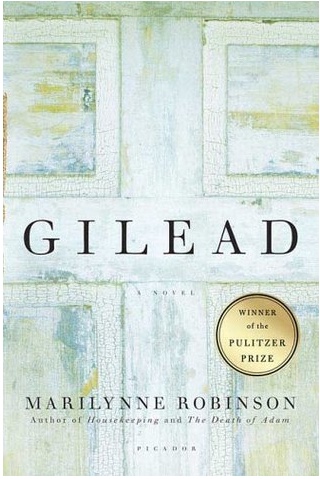Pete’s Pick
August, 2020
Gilead
Marilynne Robinson
Macmillan, 2006
Introduction
Author Marilynne Robinson won the 2005 Pulitzer Prize for Fiction with this novel, GILEAD. The book is organized without any chapter subdivisions. It is like a year long journal of the narrator of the story, one Rev. John Ames. He claims it is a series of letters he is writing to his 7-year old son.
Author
As mentioned above, Marilynne Robinson won the 2005 Pulitzer Prize for Fiction. She subsequently won the National Humanities Medal in 2012 and the 2016 Library of Congress Prize for American Fiction. She has written four novels including this one. A graduate of Pembroke College (Brown University), she also has a Ph.D. in English from the University of Washington. From 1991 until 2016, she taught at the Iowa Writer’s Workshop at the University of Iowa in Iowa City, IA.
Story
The story takes place in a little town called Gilead, Iowa. The narrator of the story is one Rev. John Ames, a 76-year old Congregationalist minister who is writing a series of letters to his 7-year old son. Yes, a 7-year old son. John Ames was born in 1880, so at 76, the story is taking place in 1956. As you read through the story, you’ll discover that John Ames was born and lived his whole life in Gilead, except for the two years he was in seminary. As he was graduating from seminary, he married a girl he grew up with in Gilead. She died during childbirth, and the baby daughter died just a few hours later. For the next 43 years, John Ames lived by himself next door to his boyhood friend Boughton, also a minister. As John writes to his son, he frequently refers to the 43 years of singleness as his dark days. This is not said as a grim characterization, just a description of time for him. The purpose in John’s series of letters to his young son is to leave the son a legacy of his father, a man who is dying as a writes and knows he will not see his son grow to maturity. John met a woman 30 years his younger during worship one Sunday morning when he was 67-years old, and they ended up marrying. She became the mother of this 7-year old boy to whom John is writing. Through these letters, John tells his son all kinds of family history. John is himself a son of a minister and his father’s father was also a minister. His mother’s father was also a minister. Wow! Quite a heritage. As John writes these letters, we learn that his grandfather moved from Maine to Kansas to participate in the Free Soilers movement, an anti-slavery movement that was active before the Civil War. When the Civil War began, Grandfather Ames joined the Union Army as a chaplain and served through the war. As John Ames writes his family story, we learn a lot about those times before and during the Civil War, as well as what life was like at the turn of the 20th century and during the first half of the 1900’s. Throughout the story, John uses his theological training, his experience of growing up in the church, and his own experience of pastoring a small town church in the town where he grew up to explain life to his son. It is a fascinating exploration of how life’s experiences influence us in even the most nuanced ways as we conduct ourselves on a daily basis. This is a wonderful story of relationships, of theology, of small town life, and even of history. It is such a wonderful description of small town life and the inter-relationships that exist among all the people who grew up together and continue to live together. The events at the end of the book provide the basis for yet another novel set in Gilead. Can’t wait to read it.
Evaluation
This was a very different kind of read for me. I tend to historical fiction, events taking place in a real time and place long ago that I already know about or studied in school. When not doing historical fiction, a good John Grisham or Pat Conroy or John Jakes easily keeps me occupied. Being a preacher’s son myself, I found it fascinating to follow John Ames’s constantly referring back to his upbringing, his growing up experiences with both father and grandfather also being preachers. I found his theological explanations incredibly fascinating, although you do not have to know theology to enjoy the storyline of the book. I was enthralled with the history from the settling of Missouri and Kansas leading up to the Civil War. And following Grandfather Ames’ experience during the Civil War brought back memories from other novels I’ve read set during the Civil War, such as those written by Jeff Shaara and his father Michael Shaara. It’s a hard read in some respects because of the way John Ames jumps around in history and settings. However, in the end, it really is an amazing legacy he leaves his son to cherish. I wonder what I would do with such a task.
